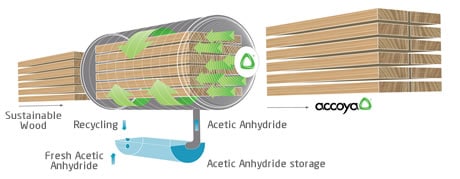Can wood windows really save you money and energy?
With energy bills continuing to soar, we’re all looking for ways we can conserve energy around our homes. When homeowners...
Read MoreLast Updated: 29 April 2025

A specially treated softwood, Accoya has gained a well deserved reputation across the home improvement industry for its impeccable insulation, durability and life-span. We offer it as a potential material to choose from in our range of high quality windows, doors and conservatories precisely because of its incredible performance. But what makes it such a good material to choose?
Time for some chemistry. Accoya is treated through the non-toxic, acetylation process. To understand how this works you have to get your head around the chemical and atomic structure of wood.
Wood contain lots of chemicals called ‘free hydroxyls’. Free hydroxyls absorb or release water depending on the climate it experiences: this is why wood expands and shrinks in certain temperatures. Scientists believe that this interaction allows enzymes to penetrate into the wood which speeds up decay.
The acetylation process changes the free hydroxyls in the wood into a chemical group called acetyl. This is done by treating the wood with acetic acid: vinegar in its most potent form. When this happens, the water absorbing capacity of the wood is reduced dramatically making it much more durable. No free hydroxyls absorbing water also means that enzymes can’t be absorbed, making the wood incredibly resistant to rot.
This process provides Accoya with some of the amazing benefits that help to make it one of the highest performing softwoods on the market.
Accoya is often touted as a timber wonder product and although you might have your suspicions, it really is as good as it sounds. Here are a few of the main benefits that Accoya wood products provide:
With an estimated working lifespan of 60 years and up, Accoya wood windows, doors or conservatories really can last a lifetime if well maintained. Made with the same attention craftsmanship and attention to detail that defines period windows, Accoya wood
Amazingly, Accoya wood also acts as a natural repellent to insects and fungi. The acetylation treatment process changes the chemical structure of the wood, making it devoid of any potential nutrients for pests. As a result, any insect that tries to eat it will quickly die or give up.
Accoya is made from softwood timber. Despite the name, softwood timbers, such as Accoya, can actually be stronger than hardwood timbers. The title is a misnomer. Softwood timber is sourced from coniferous, fast growing tree species such as redwood, fir and pine. It can be reused and recycled and its also carbon neutral. This makes it the perfect window of choice if you’re conscious about your impact on the environment.
Accoya wood has some of the strongest weatherproofing properties of modern timber. This is down, in part, to the special treatment process that Accoya goes through. The acetylation treatment process improves the dimensional stability of the wood, making it stronger and more resistant to water. This in turn makes it water-resistant and provides it with exceptional weatherproofing abilities.
Thanks to the innate structure of the softwood used in its construction, Accoya wood provides superb levels of thermal insulation. Acacia products help to slow the escape of heat from your home, keeping it warmer for longer, but using less energy in the process. This can help you to potentially save a lot of money on the cost of your heating bills.
With energy bills continuing to soar, we’re all looking for ways we can conserve energy around our homes. When homeowners...
Read MoreThere are many factors to consider when you’re looking to replace your existing windows including energy efficiency, security, and aesthetics....
Read MoreAs a country, we’re starting to look for ways to create a more sustainable future. Our focus is on ensuring...
Read MoreAccoya was created through the acetylation wood modification process, a process that has been studied since 1928. But it wasn’t...
Read More